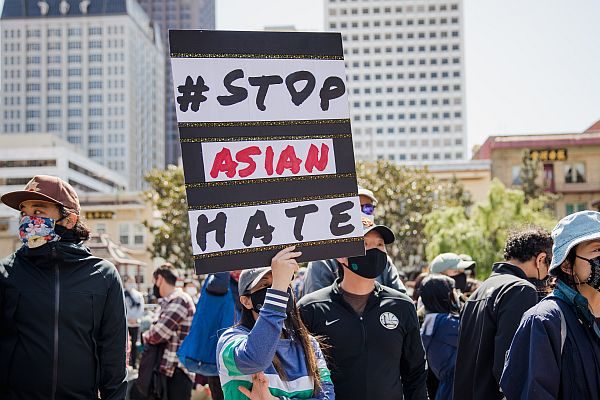There is a passage in Cathy Park Hong’s essay collection Minor Feelings that summarises how the model minority myth destroys Asian people:
We keep our heads down and work hard, believing our diligence will reward us with dignity,’ she writes, ‘But our diligence will only make us disappear.
Unlike Hong, who is Korean-American, I am a first-generation Filipina living in Australia – but her words nonetheless touched a raw nerve within me.
Over the past year, as racist attacks on Asians in Australia mounted along with the pandemic, I turned Hong’s words over and over again in my head. Each week brought a new tale of hate-filled harassment: two women spat on and called ‘Asian dogs’ in Sydney’s supposedly progressive Inner West; sinophobic graffiti spray-painted onto the home of a Melbourne family two nights in a row; a Vietnamese-Australian woman threatened with a knife and told to ‘go eat a bat’.
As the tide of anti-Asian racism steadily rose, little happened. The news reports were there but the outrage was not: journalists continued to stoke sinophobic and anti-Asian sentiments as though these were without real consequences, and my white friends were disinterested and unsympathetic whenever I raised the issue.
Then, on 16 March 2021, a white supremacist opened fire on three massage parlours in Atlanta, killing six Asian women, one white man, and one white woman. For hours I doomscrolled through social media, where responses to the hate crime were coalescing around the hashtag #StopAsianHate. On Twitter, Asian writers and celebrities used it to express their shock and sadness at the shootings, and on Instagram activists used it to put names, faces and stories to the victims.
Within days, #StopAsianHate evolved into a rallying cry at the epicentre of a broader movement as Asians and allies took to the streets across the US to demand change. Photos and footage from the rallies circulated online, emboldening diaspora Asian communities around the world to unite beneath the #StopAsianHate banner from New Zealand to the UK. This coming Saturday I’ll be attending one such rally in Sydney, jointly organised by Asian Australian Alliance and Korean-Australian media platform Kozziecom.
At this critical inflection point, when Asian diaspora communities and the specific ways racism affects us are finally being seen, it’s important for us to find and raise our collective voice. But what exactly are we trying to say?
By necessity, hashtags and slogans strip activism to their barest essence, reducing them to a tagline that can be easily repeated, replicated, reshared. Yet something about #StopAsianHate gives me pause. Something of its barest essence doesn’t quite sit right with me.
Existing as a model minority means diligently minimising yourself and your demands in the hopes of becoming the smallest possible target, the smallest possible intrusion. It means doing day-to-day bargains with white supremacy so you can exist with a shred of dignity: laughing off the umpteenth mispronunciation of your name, assuming an exaggerated Australian accent so nobody asks where you’re really from, grimacing politely when you’re confused for the only other Asian in the room because it’s funny, really.
It’s exhausting. We can’t bargain with white supremacy forever.
In some ways, #StopAsianHate feels like bargaining. Asking racists to simply ‘stop hating’ us is not the same as dismantling the systems that allow this hatred to blossom.
While #StopAsianHate is a powerful rallying cry and incitement to action, we must look beyond it and not allow it to become an end in itself. Asians can – and must – also engage in more radical forms of anti-racism. Calls for an end to hatred toward us must be paired with calls for the end of white supremacy and the use of race as a system of oppression. Otherwise, they risk signaling that Asians are happy to remain a model minority, complicit and silent in the face of continuing racial injustice so long as it’s not directed toward us.
This is something that Asians in Australia, as settlers of colour, must tackle head on. Our anti-racist activism needs to recognise that the system that allows us to be spat on and attacked in the streets is the same system that has murdered 474 Indigenous people in police custody since 1991 with no consequences. It must acknowledge that the system threatening our safety and dignity everyday is the same one that holds refugees and people seeking asylum in purgatorial, squalid offshore immigration detention facilities, and that valorises Australia military invasion and occupation abroad.
And it must call for the destruction of this system outright.
This is far from a fight for us alone. If we’re serious about tackling white supremacy, we must recognise the depth of the debt we owe to generations of First Nations activists for laying the groundwork that allows us to speak out and organise against racism in this country. First Nations and migrant communities, including our predecessors in the Asian-Australian diaspora, have fought hard against racism in this country, and we have much to learn from their legacies. In this moment and beyond, we must stand in solidarity with these communities, recognise their past and ongoing work, support their struggles – and demand not just an end to hatred toward us, but toward us all.
The Sydney #StopAsianHate vigil will take place at the Sydney Customs House this Saturday from 3 pm.
Image by Jason Leung






